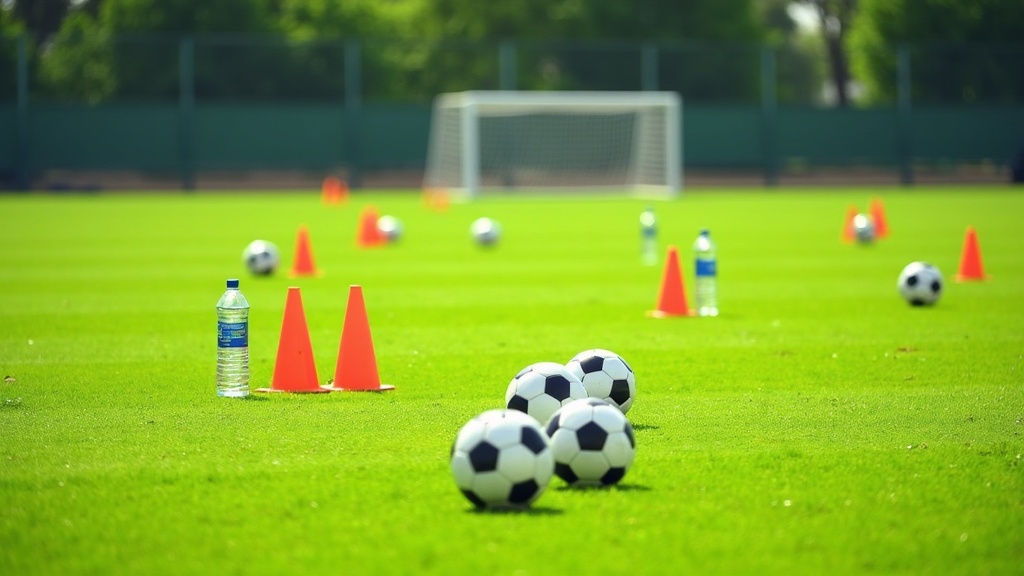![]() <>< dir>2. Game Intelligence: Understand the Flow
<>< dir>2. Game Intelligence: Understand the Flow
Players who read the game well are always in the right spot, and that’s something scouts look for right away. Off the ball movement, positioning, and smart decision-making will often catch a scout’s eye more than a fancy dribble. Watching professional games or even replays of your own matches can help you spot moments where you could have made better choices or positioned yourself differently.
Communication on the field is another big deal. Calling for passes, directing teammates, or giving basic instructions shows leadership and awareness. Even asking your coach simple questions about game tactics after practice can go a long way in building your understanding. Don’t hesitate to pick up a notebook and jot down tactical notes after watching a match; these little details can help you see patterns you might not notice on the pitch.
What to Focus On:
- Look up as you receive the ball instead of staring at your feet—this helps you make quicker decisions.
- Talk with your teammates, especially during defensive plays or when planning runs.
- Watch how experienced players move when they don’t have the ball and try folding their habits into your own approach.
3. Physical Fitness and Athleticism: More Than Just Speed
Pace gets a lot of attention, but soccer scouts also notice stamina, agility, and strength. Being able to keep up late in games, recover between sprints, and hold your own in one on one battles can give you a definite edge. I often see young players focus only on speed drills but forget core strength and simple stretching.
Flexibility and injury prevention should stay at the top of your priority list. Consistent workouts outside team training, like light weight training, agility ladder drills, or bodyweight routines, help you stay sharp and reduce downtime from injuries. Work a few minutes of yoga or basic stretching into your routine—even pros do it to help with recovery and flexibility.
Fitness Boosters:
- Include short, intense sprints with full recovery between reps during your weekly training.
- Spend a little extra time on warmups and cooldowns, as this helps muscles recover and lowers injury risk.
- Try mixing in balance and coordination drills. Being able to turn and change direction quickly is really important in matches.
If you have the chance, join other athletic activities outside of soccer, like swimming, running, or basketball. These sports can boost your endurance, footwork, and overall athleticism, and you’ll notice results on the soccer field.
4. Attitude and Work Ethic: Scouts Notice Grit
One thing I always hear from scouts: a great attitude and hard work leave a lasting impression. Players who give full effort at all times, stay positive after mistakes, and listen during coaching points stand out. No one wants a player who gives up or sulks when things go wrong; they want team players who keep pushing.
Showing respect to coaches, referees, and teammates adds a lot to your reputation. If you’re the one hustling back, picking up gear, and helping teammates, you’re showing leadership—even if you aren’t the captain. Scouts notice these moments, from warmups to cooldown laps. Remember, coaches talk to each other, and good habits will get the word out about your attitude.
How to Build Great Habits:
- Arrive at practice a few minutes early and help set up if you can.
- Keep your communication positive and encourage your teammates when things get tough.
- Own up to mistakes and show you’re open to feedback, whether after a goal conceded or a missed chance up front.
5. Playing Different Positions: Versatility Goes a Long Way
Versatile players are super valuable to coaches and scouts. If you can comfortably fill in at more than one position, you give yourself more chances to get noticed. Even if you have a favorite spot, try out different positions during friendlies or scrimmages. You’ll learn new skills and show you’re adaptable, which is always a plus.
Understanding various roles also helps you get a wider view of the game as a whole, not just from your usual position. You’ll pick up on ways to help your team and maybe even find a talent for a new part of the field you hadn’t considered.
Easy Ways to Get Versatile:
- Volunteer to play out of your usual spot during practice.
- Ask your coach about what skills transfer well between positions.
- During matches, notice what makes specific positions challenging and how you’d handle those tasks yourself.
It’s also a good idea to pay attention to how teammates in different roles contribute to the team’s success. Sometimes, playing a less glamorous spot on the field helps reveal unseen skills and even increases your value to the coach and scouts watching.
6. Team Play and Unselfishness
Soccer isn’t a one person show. Scouts look for players who lift the whole team’s level. Passing instead of forcing a solo run, tracking back to defend, and making runs to open space for others may not always show up on stat sheets, but they stand out during scouting reports.
Playing for the team rather than personal stats helps the game flow and lets everyone shine. Showing you put the team first always looks good to anyone watching from the sidelines. This creates a positive dynamic and helps set the pace for good teamwork all game long.
- Focus on simple, effective play rather than risky tricks.
- Celebrate teammates’ successes and be just as supportive during tough moments.
- Stay involved throughout the match, even if the spotlight isn’t always on you.
The best teams are often built not on one superstar, but on a group willing to work hard for each other. Taking pride in the little things, such as pressing the ball or helping with team tasks, is something scouts always notice.
Please like the post and share your view regarding the post. Leave comment below.
 Soccer scouting is one of those areas where paying attention to details can really make a difference. Young players looking to get noticed by scouts often wonder what they should focus on, both on and off the field. Standing out isn’t all about flashy skills; a mix of effort, attitude, and smart habits can often be more effective.
Soccer scouting is one of those areas where paying attention to details can really make a difference. Young players looking to get noticed by scouts often wonder what they should focus on, both on and off the field. Standing out isn’t all about flashy skills; a mix of effort, attitude, and smart habits can often be more effective.